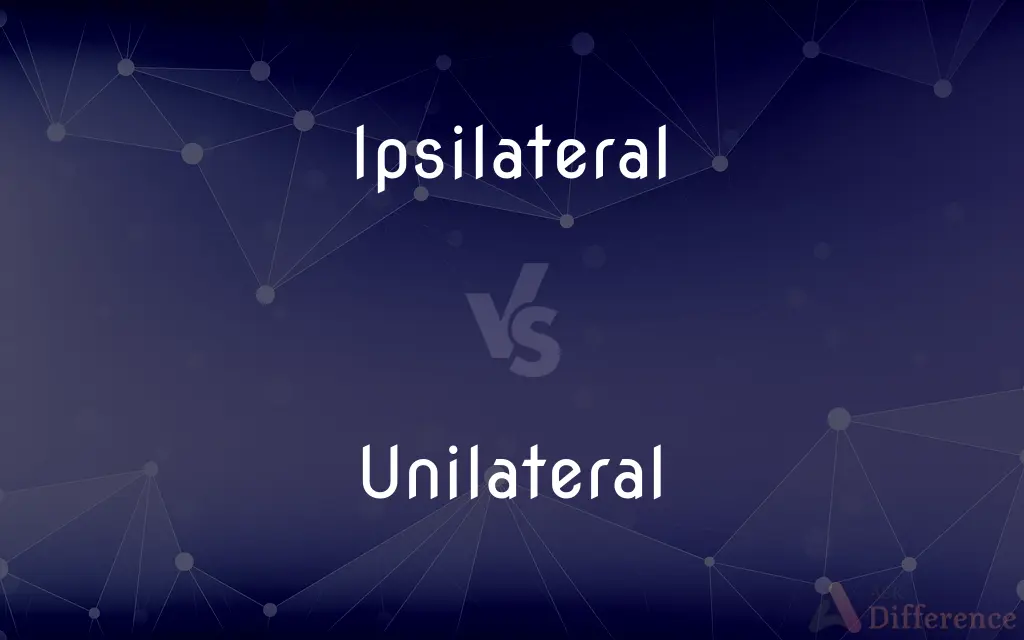Ipsilateral vs. Unilateral — What's the Difference?
By Fiza Rafique & Urooj Arif — Updated on April 17, 2024
Ipsilateral refers to something on the same side of the body, while unilateral indicates something involving one side, not necessarily comparing body sides.

Difference Between Ipsilateral and Unilateral
Table of Contents
ADVERTISEMENT
Key Differences
Ipsilateral specifically refers to structures or occurrences on the same side of the body, particularly in medical or anatomical contexts, whereas unilateral encompasses actions or conditions affecting only one side of a body, object, or group, not limited to anatomical references.
Ipsilateral is often used to describe symptoms or responses that are localized on the same side as a stimulus, such as pain or reflexes, while unilateral could describe broader phenomena like decisions or policies applied by a single entity without mutual agreement.
For instance, ipsilateral movement in a limb means movement occurs on the same side as a controlled stimulus, on the other hand, a unilateral decision might be made by one country without the consent of others.
Ipsilateral conditions are frequently discussed in neurological contexts, where specific brain functions affect corresponding body parts, whereas unilateral issues might be used in discussing situations like unilateral sanctions where a single country imposes restrictions.
While ipsilateral always pertains to the same side, unilateral is more about singularity in action or effect, regardless of sides or symmetry.
ADVERTISEMENT
Comparison Chart
Definition
Relates to the same side of the body
Pertains to one side, not necessarily bodily
Usage Context
Medical, anatomical
Broader applications including politics
Example Usage
Ipsilateral reflexes in neurological exams
Unilateral decisions in international relations
Focus on Symmetry
Always same-side oriented
May not involve symmetry
Implications
Often used in specific clinical diagnostics
Can involve actions by one party or one-sided effects
Compare with Definitions
Ipsilateral
Pertaining to the same side, especially in terms of injury or physical response.
Ipsilateral hearing loss occurs on the same side as the affected ear.
Unilateral
Describing effects or conditions affecting one side.
Unilateral deafness can complicate communication.
Ipsilateral
Situated on or affecting the same side of the body.
The doctor noted ipsilateral weakness in his right arm and leg.
Unilateral
Often used in political or diplomatic contexts.
The government imposed unilateral sanctions against the other nation.
Ipsilateral
Used in medical contexts to describe anatomical correspondence.
The stroke caused ipsilateral paralysis.
Unilateral
Pertaining to actions taken by one party.
The CEO's unilateral changes to the policy caused unrest among employees.
Ipsilateral
Involving the same side regarding neurological phenomena.
Ipsilateral eye movements were observed during the test.
Unilateral
Used to denote singularity in impact or authority.
The commander issued a unilateral order for evacuation.
Ipsilateral
Related to same-side symptoms in clinical scenarios.
She exhibited ipsilateral pain response during the examination.
Unilateral
Relating to, occurring on, or involving one side only.
He made a unilateral decision without consulting the team.
Ipsilateral
Belonging to or occurring on the same side of the body.
Unilateral
(of an action or decision) performed by or affecting only one person, group, or country involved in a situation, without the agreement of another or the others
Unilateral nuclear disarmament
Ipsilateral
Located on or affecting the same side of the body.
Unilateral
Relating to or affecting only one side of an organ, the body, or another structure
Unilateral cerebral lesions
Ipsilateral
On the same side of the body.
The stroke was characterised by ipsilateral paralysis.
Unilateral
Of, on, relating to, involving, or affecting only one side
"a unilateral advantage in defense" (New Republic).
Ipsilateral
On or relating to the same side (of the body)
Unilateral
Performed or undertaken by only one side
Unilateral disarmament.
Unilateral
Obligating only one of two or more parties, nations, or persons, as a contract or an agreement.
Unilateral
Emphasizing or recognizing only one side of a subject.
Unilateral
Having only one side.
Unilateral
Tracing the lineage of one parent only
A unilateral genealogy.
Unilateral
(Botany) Having leaves, flowers, or other parts on one side only.
Unilateral
Done by one side only.
Unilateral
Affecting only one side of the body.
Unilateral
Binding or affecting one party only.
Unilateral
Being on one side only; affecting but one side; one-sided.
Unilateral
Pertaining to one side; one-sided; as, a unilateral raceme, in which the flowers grow only on one side of a common axis, or are all turned to one side.
Unilateral
Involving only one part or side;
Unilateral paralysis
A unilateral decision
Unilateral
Tracing descent from either the paternal or the maternal line only
Common Curiosities
What is the difference between ipsilateral and contralateral?
Ipsilateral refers to the same side, while contralateral refers to the opposite side.
What does unilateral mean?
Unilateral refers to something that involves only one side, entity, or group, used in various contexts including political and social.
Can ipsilateral be used outside of medical terms?
While primarily used in medicine, ipsilateral can be applicable in any scenario discussing same-side relations.
What is an example of a unilateral decision?
A company implementing new work policies without employee input is an example of a unilateral decision.
Is unilateral always negative?
No, unilateral can simply mean one-sided and does not inherently carry a negative connotation, although it can be viewed negatively in collaborative contexts.
What does ipsilateral mean?
Ipsilateral refers to something occurring on the same side of the body, often used in medical contexts.
How is unilateral used in politics?
In politics, unilateral actions refer to decisions or actions taken by one state or actor without the agreement or participation of others.
Can unilateral actions be effective?
Unilateral actions can be effective in situations where quick decision-making is crucial and consensus is difficult to achieve.
How do doctors use the term ipsilateral?
Doctors use ipsilateral to describe symptoms, reflexes, or injuries on the same side of the body as a related condition.
How does ipsilateral relate to brain function?
Ipsilateral functions involve brain activities that affect the same side of the body, important in understanding neurological health and diseases.
Share Your Discovery

Previous Comparison
Bay vs. Bight
Next Comparison
Thunderstorm vs. MonsoonAuthor Spotlight
Written by
Fiza RafiqueFiza Rafique is a skilled content writer at AskDifference.com, where she meticulously refines and enhances written pieces. Drawing from her vast editorial expertise, Fiza ensures clarity, accuracy, and precision in every article. Passionate about language, she continually seeks to elevate the quality of content for readers worldwide.
Co-written by
Urooj ArifUrooj is a skilled content writer at Ask Difference, known for her exceptional ability to simplify complex topics into engaging and informative content. With a passion for research and a flair for clear, concise writing, she consistently delivers articles that resonate with our diverse audience.















































